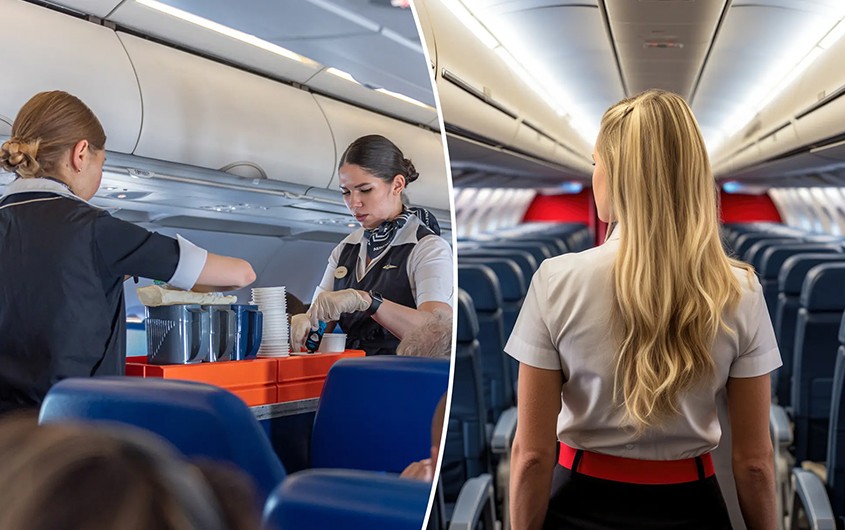
A Distance Flight Attendant Course in Aviation is tailored to individuals aspiring to pursue a career as flight attendants or cabin crew members in the aviation industry. This type of course offers flexibility for students who may not be able to attend traditional in-person classes due to various commitments. Here's an outline of what a distance flight attendant course might entail:
The dynamic operations of the aircraft sector rely heavily on flight attendants, who deliver exceptional customer service. Since there is a constant need for qualified personnel in this field, enrolling in an aviation school tailored for air hostesses can open up new career opportunities. This article explores the intricacies of aviation programs designed for positions in passenger service and how they could help people launch a successful career in the aviation industry.
The role of a flight attendant, also known as cabin crew or steward/stewardess, is multi-faceted and crucial to the smooth operation of commercial flights.
1. Customer Service and Passenger Comfort:
Provide exceptional customer service to enhance the overall travel experience for passengers.
Greet passengers as they board the aircraft, assist with seating arrangements, and stow carry-on luggage.
Offer in-flight services such as serving meals, beverages, and snacks, and attending to passenger requests with courtesy and efficiency.
Anticipate and address passenger needs, including special dietary requirements, medical assistance, or comfort-related concerns.
2. Cabin Cleanliness and Presentation:
Ensure the cleanliness and hygiene of the aircraft cabin throughout the flight, including restocking supplies, tidying up seating areas, and maintaining lavatories.
Present a professional appearance and adhere to grooming standards set by the airline, including wearing the designated uniform and name tag.
3. Security and Compliance:
Enforce security measures and regulations to safeguard passengers, crew, and aircraft against potential threats or hazards.
Assist with passenger screening procedures, baggage checks, and adherence to security protocols before and during the flight.
Remain vigilant for any suspicious behavior or unauthorized activities onboard and report them to the flight deck crew or relevant authorities as necessary.
4. Communication and Teamwork:
Maintain clear and effective communication with passengers and fellow crew members, often in multilingual environments.
Collaborate with colleagues to ensure smooth coordination of cabin operations and respond promptly to any issues or emergencies that arise during the flight.
Work as a cohesive team to ensure the safety, comfort, and well-being of all passengers onboard.
5. Crisis Management and Problem-Solving:
Remain calm and composed in high-pressure situations, such as medical emergencies, disruptive passengers, or equipment malfunctions.
Follow established procedures and protocols to manage crises effectively, prioritize passenger safety, and mitigate risks to the aircraft and its occupants.
Exercise sound judgment and decision-making skills to resolve conflicts, address passenger concerns, and maintain order and control onboard.
6. Continuous Training and Professional Development:
Flight attendants undergo regular training and re-certification to maintain their skills and stay updated on industry standards and regulations.
Participate in ongoing professional development opportunities to enhance their knowledge, skills, and proficiency in cabin crew duties and responsibilities.
Stay informed about changes in airline policies, procedures, and safety regulations to ensure compliance and readiness to handle any situation that may arise during flights.
Aviation courses for flight attendants are specifically designed to provide comprehensive training and education to individuals aspiring to work in the cabin crew role within the aviation industry. Here are some common aviation courses tailored for flight attendants:
Covers topics such as crew coordination, workload management, conflict resolution, and error management.
Emphasizes the importance of mutual support, situational awareness, and effective communication to enhance safety and efficiency in cabin operations.
Includes courses on leadership development, career planning, resume writing, interview skills, and personal branding.
Emphasizes the importance of continuous learning, skill development, and networking to advance in the field of aviation.
Emphasizes the importance of maintaining a clean, organized, and welcoming cabin environment to enhance passenger comfort and satisfaction.
1. Exciting Career Opportunities:- Completing a cabin crew course opens doors to a dynamic and rewarding career in the aviation industry. Flight attendants have the opportunity to travel to various destinations, meet new people, and experience different cultures while working onboard flights.
2. Diverse Work Environment:- Working as a flight attendant offers a diverse and dynamic work environment, with opportunities to work on different types of aircraft, with diverse crew members, and serve passengers from various backgrounds and cultures.
3. Flexibility and Work-Life Balance:- Cabin crew members often enjoy flexible work schedules and the opportunity to bid for preferred routes or layover destinations. This flexibility allows them to balance their work commitments with personal and family responsibilities.
4. Global Exposure and Networking:- Flight attendants interact with passengers from around the world, allowing them to build a global network of contacts. They gain exposure to different cultures, languages, and lifestyles, which broadens their perspective and enriches their life experiences.
5. Training and Development Opportunities:- Airlines invest in the training and development of their cabin crew members to ensure they are well-prepared to handle various situations onboard flights. Completing a cabin crew course provides comprehensive training in safety procedures, customer service, emergency protocols, and aviation regulations, giving individuals a competitive edge in the job market.
6. Job Satisfaction:- For many, working as a flight attendant is more than just a job – it's a lifestyle and a passion. The opportunity to travel, meet new people, and make a positive impact on passengers' travel experiences can be immensely fulfilling and rewarding.
Pursuing a flight attendant course in the aviation industry offers numerous benefits, including exciting career opportunities, job security, competitive salary and benefits, personal and professional growth, global exposure, and job satisfaction. It's a rewarding career choice for individuals who are passionate about travel, customer service, and making a difference in the lives of others.